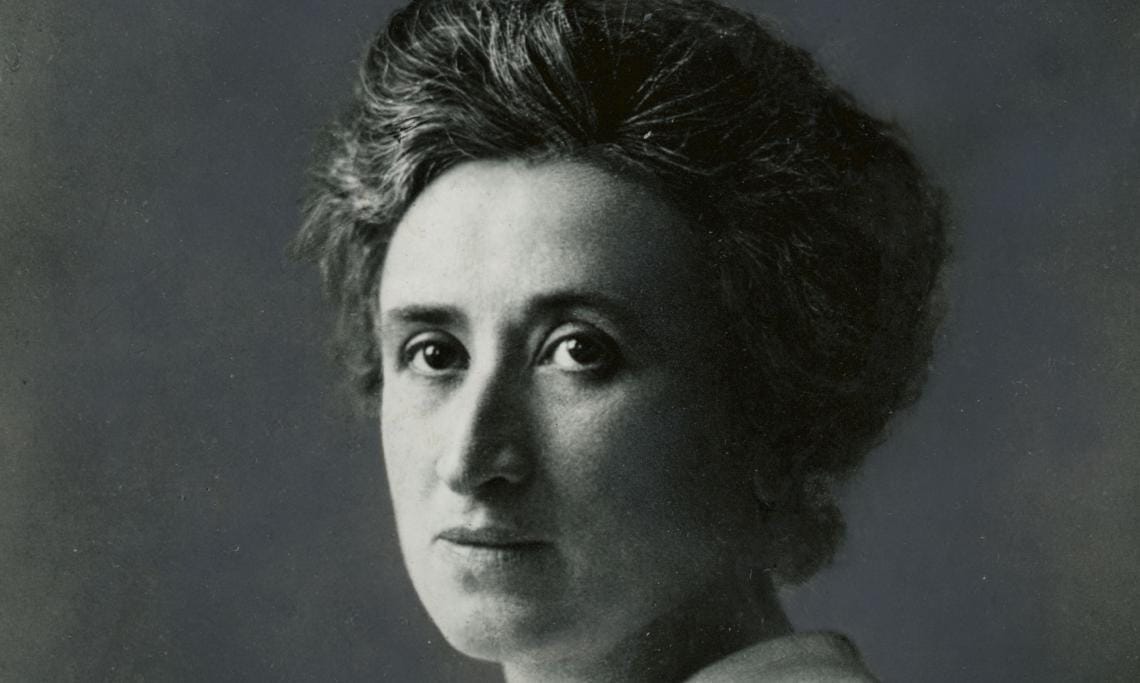Rosa Luxemburg: Revolutionary Theorist and Martyr of the Left

Rosa Luxemburg, born on March 5, 1871, in Zamość, Poland (then part of the Russian Empire), remains one of the most influential and revered figures in socialist theory and revolutionary practice. Her life, marked by her passionate commitment to Marxist ideology, unwavering advocacy for the working class, and her ultimate martyrdom, has made her an enduring symbol of the struggle for social justice and equality.
Early Life and Education
Luxemburg was born into a Jewish family and demonstrated intellectual brilliance from an early age. Despite facing discrimination and physical challenges—she suffered from a hip ailment that left her with a permanent limp—she excelled academically. Luxemburg moved to Zurich, Switzerland, in 1889 to pursue higher education, as the universities there were more welcoming to women. She earned a doctorate in law and political science in 1897, making her one of the first women in Europe to achieve such an academic distinction.
Political Involvement and Theoretical Contributions
Luxemburg's political activism began early, with her involvement in the Polish Socialist Party. However, her opposition to Polish nationalism led her to break away and co-found the Social Democracy of the Kingdom of Poland and Lithuania (SDKPiL). She believed that the struggle for socialism should be international and not confined to national borders.
- Critique of Revisionism: Luxemburg was a staunch opponent of Eduard Bernstein's revisionism within the German Social Democratic Party (SPD). Bernstein argued for a gradual, reformist approach to socialism, which Luxemburg vehemently opposed. Her work, "Social Reform or Revolution" (1899), articulated a powerful defense of revolutionary Marxism, emphasizing the necessity of mass action and the overthrow of capitalist structures rather than gradual reform.
- Mass Strike Theory: Luxemburg's seminal work, "The Mass Strike, the Political Party, and the Trade Unions" (1906), was based on her observations of the 1905 Russian Revolution. She argued that spontaneous mass strikes were a fundamental aspect of the revolutionary process, challenging the more cautious approaches of some socialist leaders. Her insistence on the importance of workers' spontaneity and grassroots movements significantly influenced socialist strategies worldwide.
The German Revolution and the Spartacist Uprising
During World War I, Luxemburg was a vocal critic of the SPD's support for the war. She believed the war was a capitalist endeavor that pitted workers against each other. In 1916, she, along with Karl Liebknecht, founded the Spartacus League, which later became the Communist Party of Germany (KPD). The League was dedicated to revolutionary socialism and opposed to the war and the SPD's policies.
- Imprisonment and Writings: Luxemburg spent much of the war in prison due to her anti-war activities. Despite her imprisonment, she continued to write prolifically, producing some of her most important works, including "The Junius Pamphlet" (1916), which critiqued the war and called for a proletarian revolution.
- German Revolution of 1918-1919: Following the end of World War I, Germany was in a state of political upheaval. Luxemburg and the Spartacists saw an opportunity for a socialist revolution. In January 1919, they launched the Spartacist Uprising, aiming to overthrow the Weimar government and establish a socialist state. However, the uprising was brutally suppressed by the government, aided by right-wing paramilitary groups known as the Freikorps.
Death and Legacy
On January 15, 1919, Rosa Luxemburg and Karl Liebknecht were captured by the Freikorps in Berlin. They were brutally beaten, interrogated, and subsequently murdered. Luxemburg's body was dumped into the Landwehr Canal, where it was later recovered.
Luxemburg's death marked a tragic end to her relentless fight for socialist ideals. Her writings and theories, however, have left a lasting impact on socialist thought and revolutionary movements worldwide. Her critiques of both capitalism and authoritarian socialism have made her a unique and respected figure in leftist intellectual traditions.
- The Rosa Luxemburg Foundation: Established by the German left-wing political party Die Linke, the foundation continues her legacy by promoting democratic socialism and supporting social justice initiatives globally.
- Enduring Influence: Luxemburg's ideas on democracy, mass action, and internationalism continue to inspire contemporary social movements. Her emphasis on the importance of freedom and democracy within the socialist framework distinguishes her from other Marxist theorists and remains relevant in discussions about the future of socialism.
Conclusion
Rosa Luxemburg's life and work embody the relentless pursuit of justice, equality, and human dignity. Her contributions to Marxist theory, her steadfast opposition to war and capitalism, and her advocacy for democratic socialism have cemented her place as a towering figure in revolutionary history. Luxemburg's legacy continues to inspire those who seek a more equitable and humane world, making her a timeless icon of the struggle for social justice.



